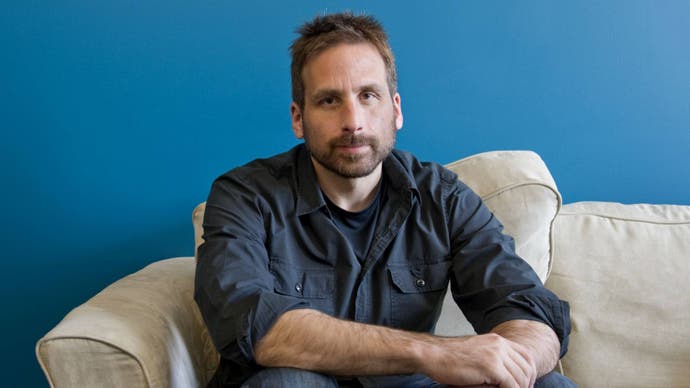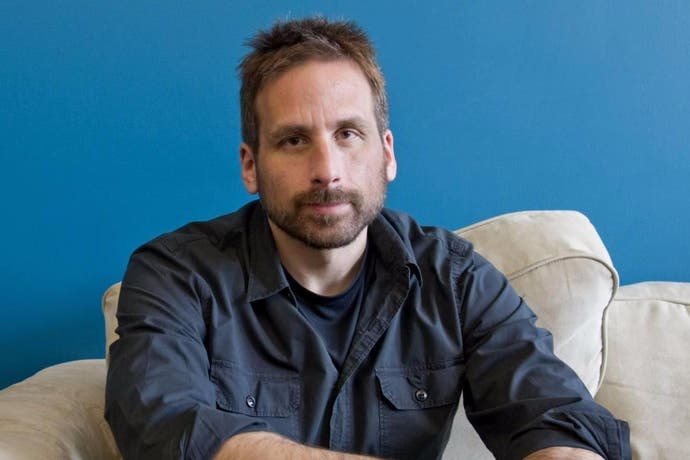Ken Levine's next game will be "more challenging" than BioShock
And how Ghost Story is managing expectations of its revolutionary "narrative Lego".
BioShock creator Ken Levine took the stage at EGX Rezzed in London today for a look back over his career so far, in a conversation with Eurogamer's Oli Welsh.

Afterwards, I met with Levine for a look forwards towards his next project - the as-yet untitled game which will be the first from Levine's new, smaller studio Ghost Story.
We've heard snippets of information in the past about how this new project is a reaction to how traditional story-led games - particularly ones made on huge budgets which take years to finish - are made.
Levine has used the term "narrative Lego" to describe a story-based game which can be replayed multiple times for a different experience. During his conversation on stage with Oli, he also mentioned how he wanted to push back on the notion that big budget games must be focus tested and easily understood by a wide audience.
It is this more hardcore audience of gamers that this new game is being made for, Levine said.
"We're less concerned with making sure this is as smooth an experience..." Levine trails off. "I mean, we worked hard on BioShock and BioShock Infinite to make it fairly frictionless. I've been inspired by games which are comfortable with a little friction, which doesn't hand you things, which tests you both with difficulty and how it works. How things work aren't laid for you.
"It is also going to be a more difficult experience, more challenging to the gamer than the last two games we've done," he added - BioShock and BioShock Infinite. (BioShock 2 was made by a separate team.)
"The impetus [for change was] you spent five years on a game which people finish in a weekend," Levine continued. "I'm really envious of games like Civilization which I've played for a very long time. A lot of games now are built to maintain a long relationship with the gamer. My games haven't really had that. So this appealed to me."
Levine's conversation with Oli also touched on how all games change through development - and that this was no bad thing. More to the point, a game often only comes together in its final stages as the realities and pressures of finishing a project prompt tough decisions to be made - when you have a "gun to your head", Levine put it.
But Levine is no longer at a big studio with an even bigger publisher breathing down his neck. He will have to police himself, and his studio police him. Who will hold the gun to Levine's head now?
"It's very important we [all] do," he said. "We're part of Take-Two - we're not being published by 2K but are owned by Take-Two - and they're very generous with us in terms of giving us space and time. We think to make good games you do need to have an entrepreneurial spirit of 'what are the constraints we're giving ourselves and 'when is this game going to end?' And really strive to do that. Because often if you don't pose constraints things tend to go pear-shaped.
"They are self-imposed constraints but we take them very, very seriously because it makes us better developers.
"We're not going to ship anything we don't think is awesome and we are fortunate we don't have to, but when you set a time for yourself it forces yourself to make decisions, and that's when the great work is done, when you really have to make those decisions. We've actually just gone through another scheduling pass recently and the team found it a really positive experience - it forced us to really say 'what is this game', what stays, what goes, what's important. I found that to be a very helpful process."
The specifics of Ghost Story's game remain under wraps - and it sounds like they will for a while. All this promise of narrative Lego and of changing the way people play story-led games generates big expectations. And in a post-No Man's Sky World, it's an issue all developers are aware of.
"[That's] one of the main reasons we're not communicating right now," Levine answers. "Game development is a perilous process especially when you're out there talking about. Things change from under you.
"Ideally, and I don't know, but ideally we'd want to just say 'here it is, go check it out'," he teases. "But we're really not going to be talking about this thing publicly until we have a high degree of certainty of what it's going to look and feel like."


